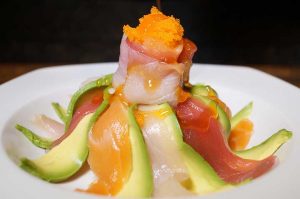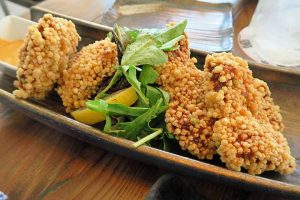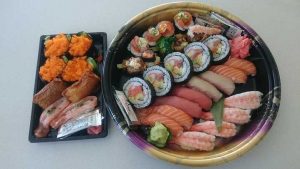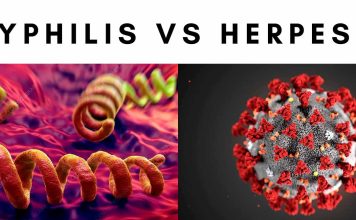Table of Contents
Masago Overview
Masago is a commonly used term for smelt roe, which are edible eggs of the smelt family Mallotus villosus (Capelin fish).
It is sometimes used to cover the outside of sushi rolls and in the cooking of sushi fillings. It is often seen in orange, green, or red, but it is actually a pale-yellow color. They use food coloring to make it orange, green, or red when cooking.
Masago is a highly prized ingredient used in sushi. Despite their small size, these small orange balls can transform a simple sushi dish into something more lavish and elegant. They have such a crunchy texture and a salty and sweet flavor with a touch of bitterness. Masago is rich in nutrient properties and has many health benefits.
What is Masago?
Masago, also known as smelt roe, is a type of fish egg derived from capelin, a fish species found mainly in the North Atlantic, North Pacific, and Arctic Oceans. The capelin fish is a representative of the smelt family and is an important forage fish in the diets of Atlantic cod and other species such as the harp seal.
The meat of the capelin is not widely eaten, although it is sometimes dried, grilled, or salted. It is usually reduced to a meal or oil and used to make fish feed or fertilizer. Masago roe, on the other hand, is a common ingredient in a variety of traditional Japanese dishes.
The tiny eggs have a sweet and savory taste and add crunch to dishes. It is often used in masago sushi and seafood recipes, and it can also be used to enhance the flavor of sauces and dips.
Masago is well-known for its excellent nutrient profile, in addition to being extremely versatile. Aside from being low in calories, each serving of masago contains a substantial amount of protein, vitamin B12, selenium, and magnesium, as well as a variety of other essential nutrients.

Health Benefits of Masago
While masago is usually eaten in small quantities, it has a fairly comprehensive nutrient profile and can increase your intake of several main nutrients such as vitamin B12, selenium, and magnesium. It’s also a nutrient-dense meal, which means it has a high concentration of these essential vitamins and minerals for a low-calorie count.
High-Quality Protein Intake
A single 1-ounce (28-gram) serving contains 6 grams of high-quality protein, which is roughly equivalent to one large (50-gram) chicken egg.
Protein is the most satiating and helps control appetite as compared to carbs and fat, the other two macronutrients.
Including protein-rich foods like masago in your diet can help you stay full and avoid overeating, which can aid in weight loss.
Fish roe is a complete protein, which means it contains all eight necessary amino acids needed by your body.
Vitamin B12 (Cyanocobalamin) and Selenium
Masago contains a high concentration of selenium. As a result, it is a very effective antioxidant for the body. Seafood contains a high concentration of selenium. As a result, it will help to minimize oxidative stress and improve the thyroid and immune systems.
Several studies have shown that consuming selenium-rich foods improves the immune system and prevents mental deterioration. Masago is also a good source of Vitamin B-12. Vitamin B-12 is important for energy production and nerve protection.
Omega-3 Fatty Acids
Masago contains omega-3 fatty acids at a high concentration. This fatty acid also can be present in both terrestrial and marine environments. They are in control of many cellular functions, including signaling, cell membrane fluidity, and structural maintenance.
They also control the nervous system, blood pressure, hematological clotting, glucose tolerance, and inflammatory processes, which can be beneficial in all inflammatory conditions. n-3 PUFAs have been shown in animal models and cell-based models to affect skeletal muscle metabolism.
Furthermore, recent human studies show that they can affect not only the exercise and metabolic response of skeletal muscle, but also the functional response during an exercise training cycle. Furthermore, due to their increased reactive oxygen production, their potential anti-inflammatory and antioxidant activity can provide health benefits and performance improvement, especially in those who engage in physical activity.
This analysis emphasizes the importance of n-3 PUFAs in our diet, with an emphasis on their possible health benefits in sports.
Low Level of Mercury
Since capelin is a small forage fish, it has a lower mercury content than larger fish such as mackerel and swordfish.
Mercury is a naturally occurring contaminant as well as a man-made contaminant. The release of refined mercury will result in a gradual increase in the amount of ambient mercury, which reaches the atmospheric-soil-water distribution cycles and can circulate for years.
Mercury poisoning is caused by exposure to mercury or mercury derivatives, which causes a variety of toxic effects depending on the chemical type and route of exposure.
The most common way for humans to be exposed to methylmercury (MeHg) is through the consumption of infected fish, seafood, and wildlife that has been exposed to mercury through the ingestion of contaminated lower species.
Toxicity from MeHg has been linked to nervous system damage in adults and impaired neurological development in infants and children. Mercury ingested can bioaccumulate, resulting in progressive increases in body burdens.
The systemic pathophysiology of individual organ systems associated with mercury poisoning is discussed in this study. Mercury has toxicological effects on the cellular, cardiovascular, hematological, pulmonary, renal, immunological, neurological, endocrine, reproductive, and embryonic systems.
Downsides of Masago
Masago has some demerits also. But these are not as concerning as you should avoid masago. But it’s worth mentioning them.
High Level of Sodium(Na+)
Masago is moderately high in sodium, with a single tablespoon containing around 10% of the daily recommended value. Those with high blood pressure or heart attacks can limit their sodium intake to keep their blood pressure under control.
Overdoing it on the sodium can also lead to other health concerns, and a high sodium intake has been linked to issues such as stomach cancer and bone loss.
Read Cardiac Glycosides
Allergic Reaction
Since masago is a seafood product, it should be avoided by those who are allergic to fish or shellfish.
Fish roe contains vitellogenin, a protein found in fish egg yolks that has been described as a possible allergen.
Furthermore, fish roe can cause allergic reactions in people who do not have seafood allergies. These include rashes, airway narrowing, and low blood pressure.
Fish roe is the sixth most popular food allergen in Japan.
Ecological Concern
Masago intake may be related to some environmental issues. Indeed, the Department of Fisheries and Oceans recently announced that capelin stock decreased by 70% between 2015 and 2018, which is thought to be mostly due to environmental factors rather than overfishing.
However, this does not rule out the possibility that fishing is contributing to the issue. According to a report, fisheries often target egg-bearing fish, upsetting the fragile environment and leading to declining capelin populations. This not only effectively eliminates the next generation of capelin, but also reduces the food supply for large predatory fish that depend on species like capelin for survival.
Food-borne Illness
Masago is also widely used in the cooking of sushi, a popular food that has the potential to cause health problems. Furthermore, sushi is usually made with farmed fish, processed carbohydrates, and dubious ingredients. Sushi contains raw fish, which raises the risk of parasitic infections and foodborne illnesses.
Nutrition of Masago
Calorie values along with other nutrients quantity in 100 gram of masago are given below;
- Calorie 143 Kcal
- Total Fat 6.4 g
- Protein 22.3g
- Carbohydrate 1.5 g
- Vitamin A – 299 IU (6% of daily value)
- Vitamin C – 16 mg (27% of DV)
- Vitamin E – 7 mg (35% of DV)
- Riboflavin (B2) – 0.7 g (44% of DV)
- Vitamin B12 – 10 mcg (167% of DV)
- Folate (B9) – 80 mcg (20% of DV)
- Phosphorus – 402 mg (40% of DV)
- Selenium – 40.3 mcg (58 % of DV)

Best Way of Eating Masago
Masago is a one-of-a-kind ingredient that could be used in a variety of ways. Its semi-crunchy texture and salty taste make it ideal for Asian-inspired dishes or appetizers. It is available from a variety of seafood vendors in a variety of flavors, including ginger, wasabi, and squid ink.
Here are several ways to include masago into your diet;
- Add a few teaspoons of masago to homemade sushi rolls.
- For a tasty appetizer, combine masago, cheese, and fruit on a plate.
- Masago can be used to spice rice dishes.
- Masago is a unique topping for poke bowls.
- Masago can be used in Asian noodle dishes.
- To add a flavorful twist to the recipe, top the fish with masago.
- To spice sushi rolls, combine masago with wasabi or spicy mayonnaise.
- Since masago is typically high in salt, you only need a small amount to pack a flavorful punch.
- Though it is most commonly used in Asian cuisine, masago can be used in a variety of recipes that call for something salty.

Takeaway
The edible eggs of the capelin fish are known as masago or smelt roe.
They’re high in protein and nutrients including omega-3 fatty acids, selenium, and vitamin B12.
Avoid roe products that contain added salt, MSG, or high fructose corn syrup, reduce masago if you have high blood pressure, and avoid it entirely if you are allergic to seafood.
If you can handle seafood and are looking for an exotic ingredient to add a unique flavor to your recipes, you can try masago without any hesitation.
Last Updated on February 23, 2022 by Learn From Doctor Team





